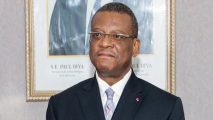7, November 2017
Ambazonians Have a Fundraising Problem 0
The momentum is all on Ambazonia’s side. President Biya and his gang of Francophone political elites are historically unpopular. The Ambazonia political base is angry and activated, with regular mass protests and the killing of a gendarme all testifying to the seriousness of the Southern Cameroons resistance. The ruling CPDM crime syndicate has been banned in Southern Cameroons and above all, listed as a terrorist organization. Consequently, it is widely expected that French Cameroun opposition will make gains in the 2018 presidential elections, and that Biya himself will face an extremely tough re-election battle and may end up in exile. But by some strange happenstance this momentum has not translated into the currency that matters most in every liberation struggle: cold, hard cash.
The Governing Council of the Federal Republic of Ambazonia has a fundraising problem and it is lagging far behind its French Cameroun counterpart which is the Biya Francophone Beti Ewondo regime that still has complete and total control of Southern Cameroons oil revenue and the Bakassi oil and gas fields.
The main difference is that La Republique du Cameroun has a sitting head of state that runs the nation as a private estate and who can drive huge-dollar donations from the French government, the French dominated International Monetary Fund and rich European corporations. Any African dictator heading a consortium of crime syndicates such as the one headquartered in Yaoundé is an ATM machine. That’s something that Ambazonians and their Governing Council don’t have right now. But Southern Cameroonians are also presiding over a fractured and scattered resistance regime, which the international community thinks they are divided in terms of both tactics and priorities.
There is no denying that the many Southern Cameroonian groups in the USA have contributed immensely to the struggle. But by providing Ambazonians a leader and a political base in Nigeria, SCACUF has done what Napoleon left undone for the West Cameroon resistance. The Nigerian structure is what the struggle had been missing over the years and what the Governing Council is sorely missing now is the North American group, who proved to be an especially talented force ever since the revolution started.
With the declaration of independence and the creation of the Federal Republic of Ambazonia, His Excellency President Sisiku Ayuk Tabe and his French Cameroun counterpart, Paul Biya are roughly neck-in-neck overall in various diplomatic push. The quest for attention by some Southern Cameroons leaders in the Diaspora has frustrated many Ambazonians, who see Biya’s health issues, his sinking favorability and stalled Francophone agenda and wonder why Ambazonians can’t take advantage of that and stay united in the Ambazonia struggle.
Some are spending precious time raining attacks on the Governing Council and have argued that Southern Cameroonians can wage the liberation war “together differently”. Mindful of the present difficulties confronting Southern Cameroonian refugees in Nigeria. Considering that the overall levels of cash swimming around La Republique and the Governing Council are not similar and that the Ambazonian Governing Council has more issues to deal with before the 2018 presidential elections and beyond, there is an urgent need for every Southern Cameroonian group to rally behind the Head of State of the Federal Republic of Ambazonia, President Sisiku Ayuk Tabe. Southern Cameroonians back home including the thousands that have left the homeland to neighboring Nigeria have been incessantly flashing out signals that the Anglophone Diaspora doesn’t stand for much other than opposing Biya.
By Soter Tarh Agbaw-Ebai
Cameroon Concord News Group
























12, November 2017
Ambazonia watching nervously as Biya Francophone regime flirts with EU, AU and the US 0
The Biya Francophone regime is quietly trying to reach out to the European Union, the African Union and the UN on the disturbing situation in Southern Cameroons. The Yaounde regime’s ties with the West and many other African states have been virtually frozen since La Republique authorities ordered soldiers to killed hundreds of protesters in West Cameroon.
Yaounde denied it ordered the killings on October 1 but offered talks with Ambazonians to start “shedding light” on the British Southern Cameroons marginalisation case.
For more than a year now, La Republique du Cameroun has done little or nothing to investigate the rapes, extra judicial killings and arbitrary arrests currently going on in Ambazonia. Some French Cameroun political elites have called the genocide in Southern Cameroons a national disgrace. But there seems to be no signs of a thaw in the two nations.
Ambazonia biggest consumer of La Republique’s goods and services
French Cameroun exports to the Federal Republic of Ambazonia internet services, which dropped amid sour relations, electricity, banking, the franc CFA and medicines. And as Southern Cameroonians are working to pressure La Republique to end its colonization and genocide- terrorism in Ambazonia, a few passing for CPDM militants are moving in the opposite direction. But there are signs that these pro CPDM comedians will fail.
The success of the 4th Conclave and the renaming of the territory by the Governing Council have made matters more intractable for the 84 year old French Cameroun dictator. Soon and very soon, the interim head of the state of the Federal Republic of Ambazonia will announce his first cabinet and some U.N. member states are expected to recognize the government.
EU, AU and U.N. representatives have turned a blind eye on the fake revelations made by the French Cameroun government spokesman, Issa Tchiroma that Southern Cameroons militants killed 4 gendarmes including a soldier. The international community is aware that junior officers in the French Cameroun army have recently been killing top Francophone commanders. Many of such incidences have been recorded in the Far North and East regions of La Republique du Cameroun. La Republique has been deploying troops to Southern Cameroons with no food, no money and to be sure, no nothing. In the Manyu State, Francophone soldiers have been stealing from shop keepers and looting business centers in Mamfe, Ekok and Eyumojock.
La Republique keen to mend ties with the EU and the US
Biya and his CPDM crime syndicate have every reason to want to mend relations with the EU and the US. Running short of cash and increasingly isolated due to its mismanaging of the Southern Cameroons crisis, Yaoundé has few allies such as Gabon and Chad and badly needs European friends including some in the US after it accused Paris of working to destabilize Cameroun. Biya’s motives for warming up to Gabon and Chad are unclear. In general, we see a ‘Third Worldism’ in La Republique’s foreign policy – asserting independence from the big powers such as France which of course is already heralding the collapse of the Francophone regime.
The United States has had its own difficulties with the Biya Francophone government. There are concerns about unresolved issues following the deployment of US troops in the North of La Republique du Cameroun. Amnesty International reported that US soldiers were overseeing a torture chamber used by the French Cameroun army on captured Boko Haram militants. Francophone political elites had described as a “Greek Gift” hundreds of helmets donated to the Cameroun army by the US. The incident annoyed Washington.
French Cameroonians worried
French Cameroun communities have grown increasingly worried over the Biya regime’s astonishingly low sense of judgment ever since the beginning of the Southern Cameroons crisis with many Francophone political elites expressing their unease about the future of La Republique after Paul Biya.
That unease is shared by even the Bamilekes who from the very beginning supported the Biya regime and are now losing millions due to the crisis. The Bamilekes are unlikely to push hard for the replacement of President Biya with one of their own.
Governing Council denied allegations that it planned attacks:
In a recent statement with Cameroon Concord News Group, Sisiku Ayuk Tabe, the interim president of the Federal Republic of Ambazonia condemned the killings of French Cameroun security agents deployed to Southern Cameroons. The Governing Council also reechoed that “Relations between the Federal Republic of Ambazonia and the people of French Cameroun have been the subject of Biya-CPDM sabotage.
African Union and UN voices have however said that there are limits on how close La Republique du Cameroun can get in seeking the support of the international community with thousands of Southern Cameroonians as refugees in neighbouring Nigeria.
By Soter Tarh Agbaw-Ebai